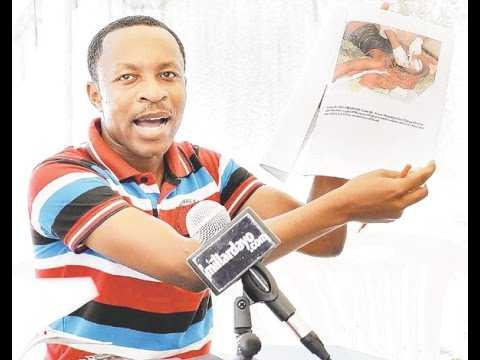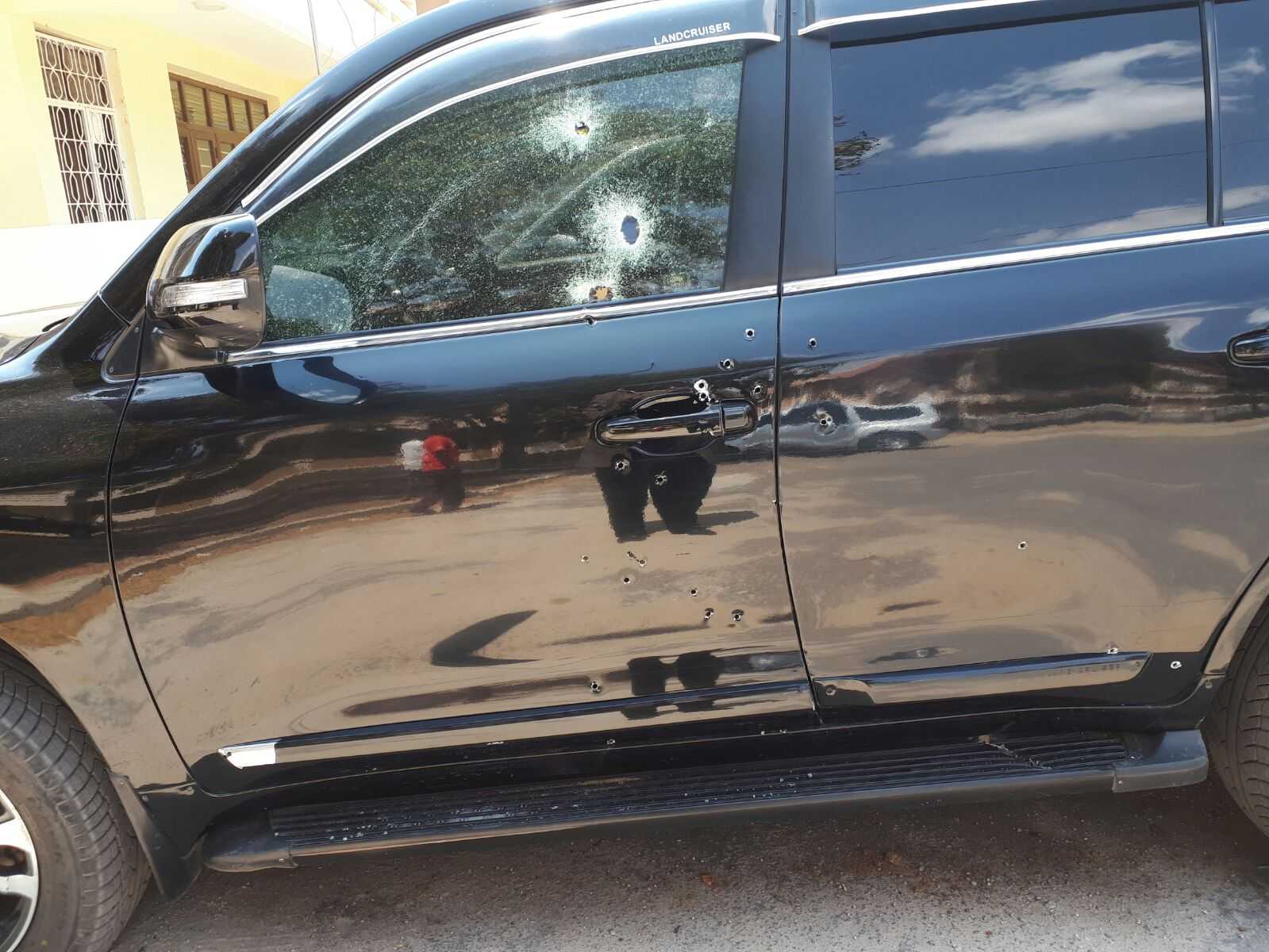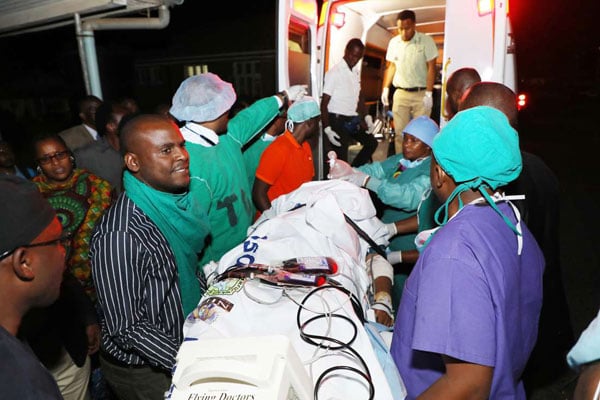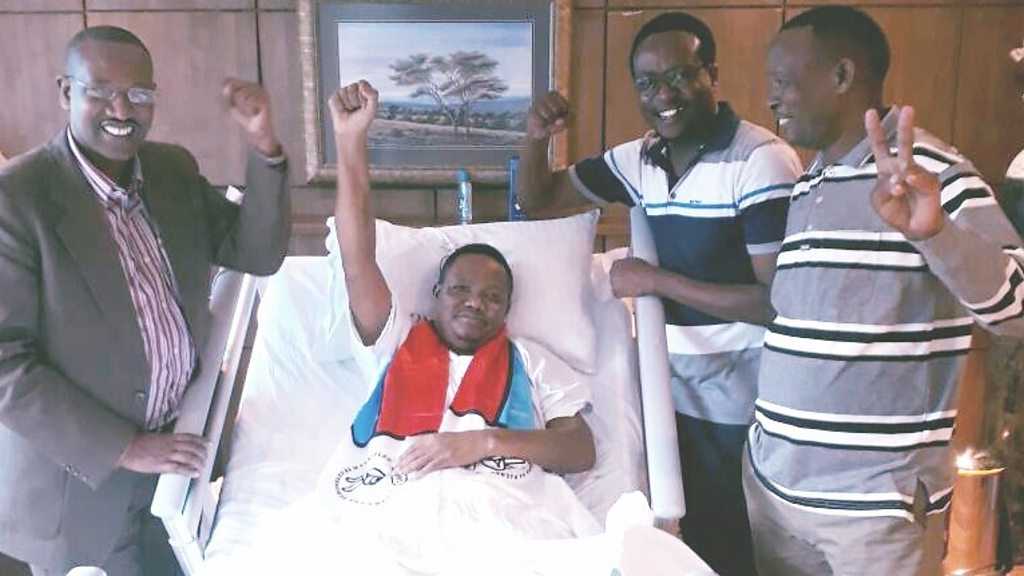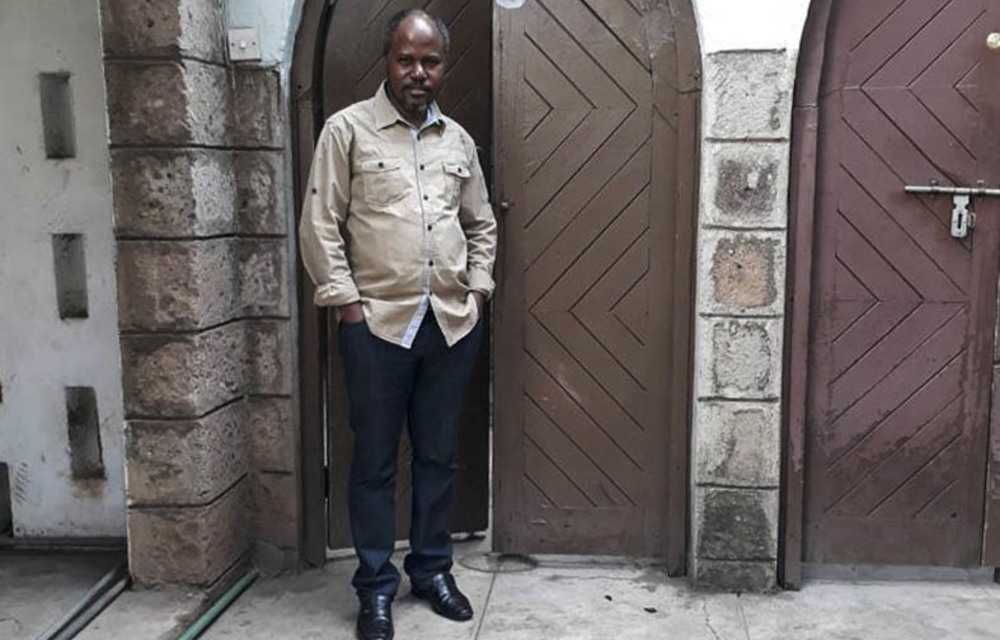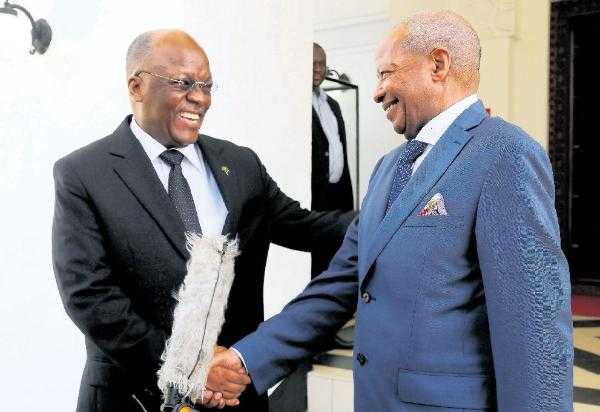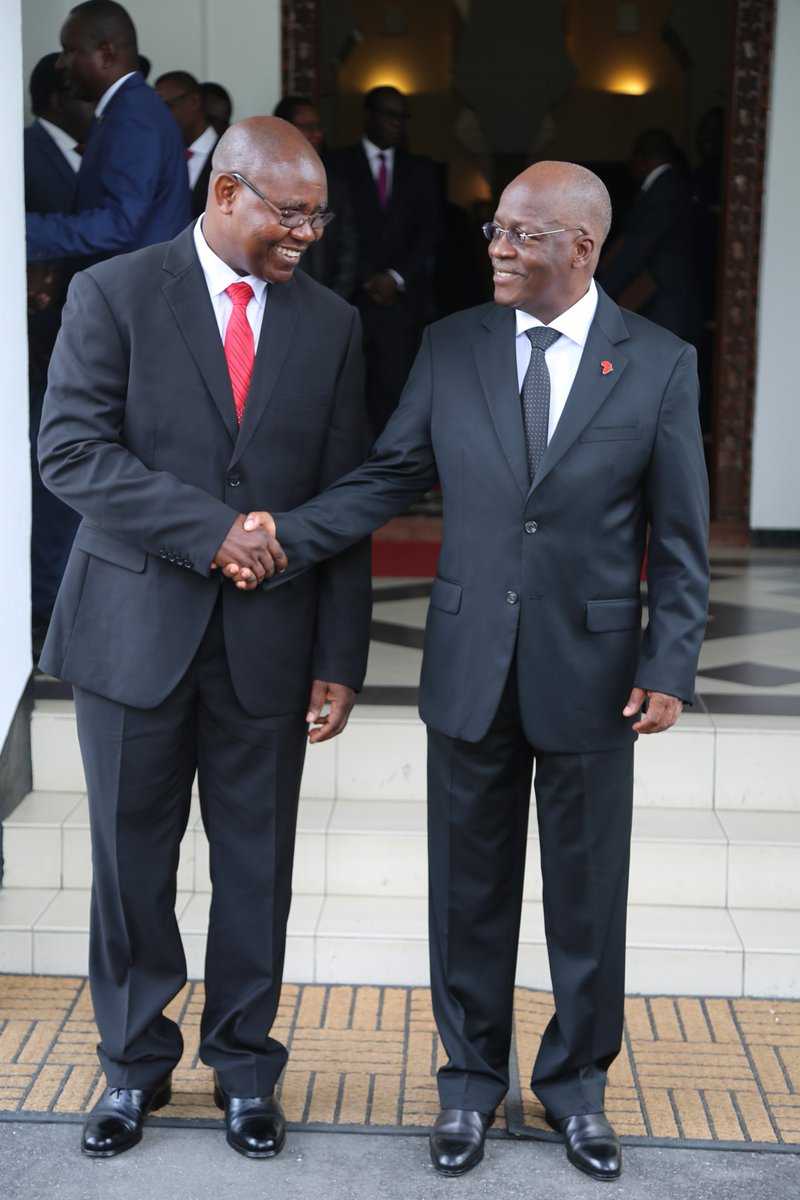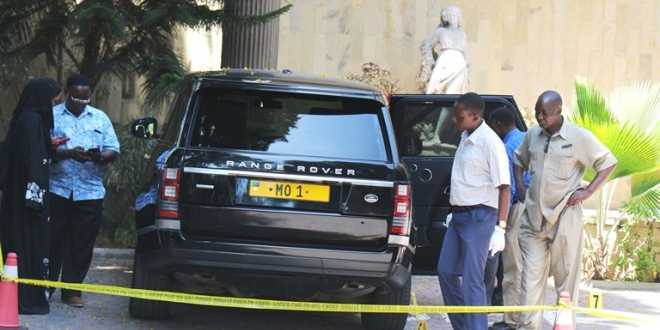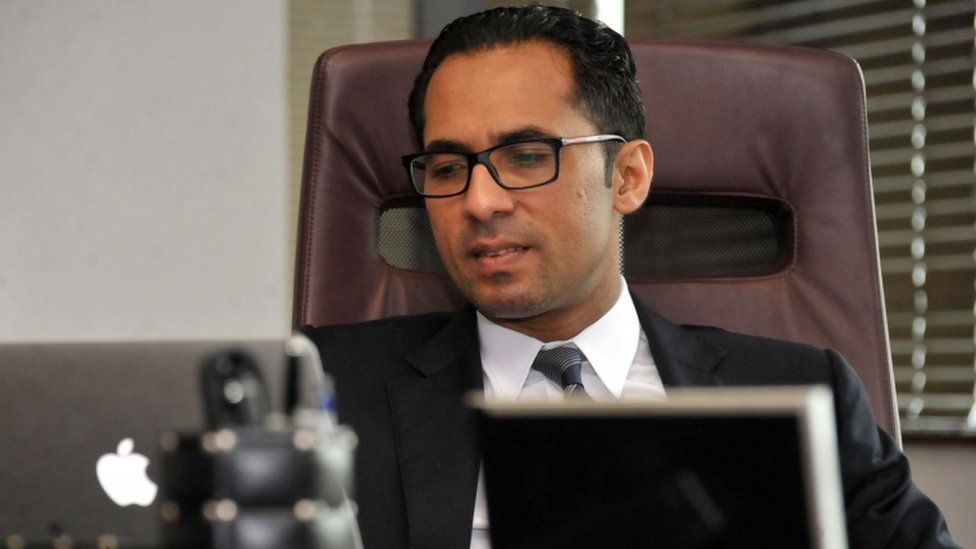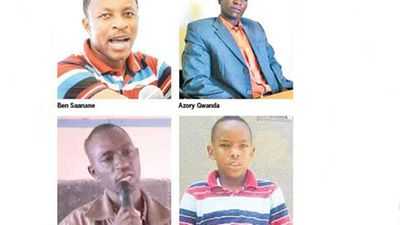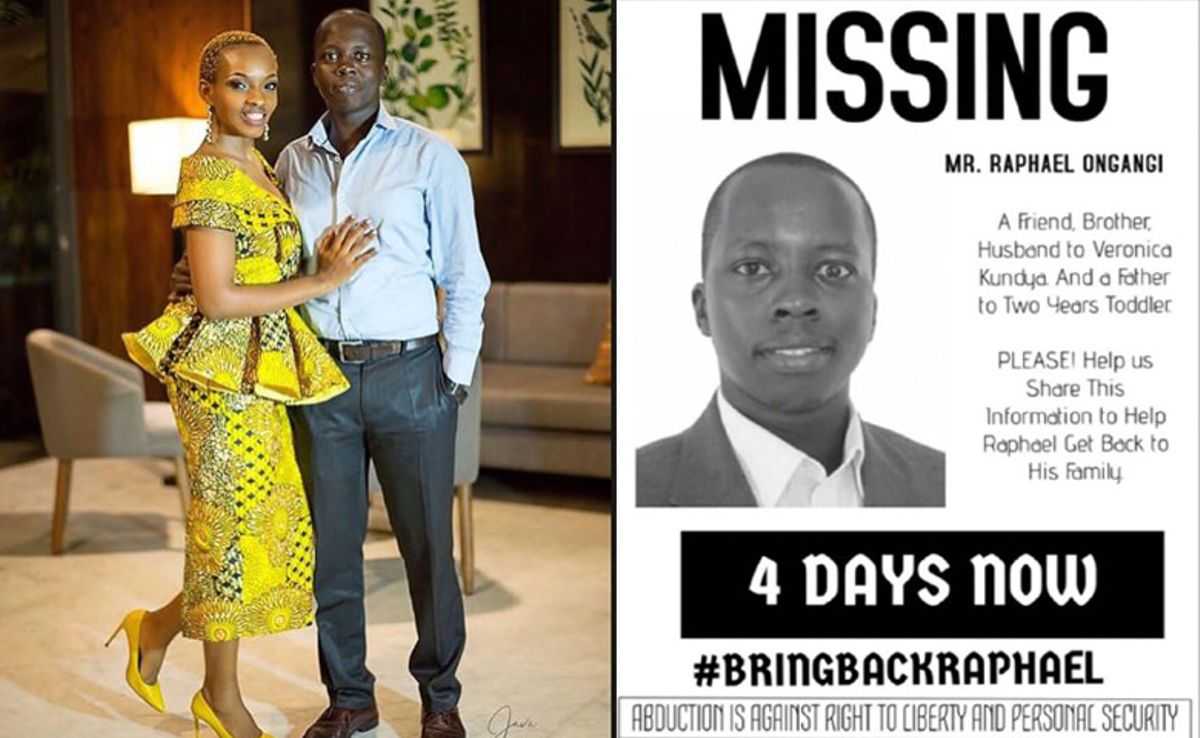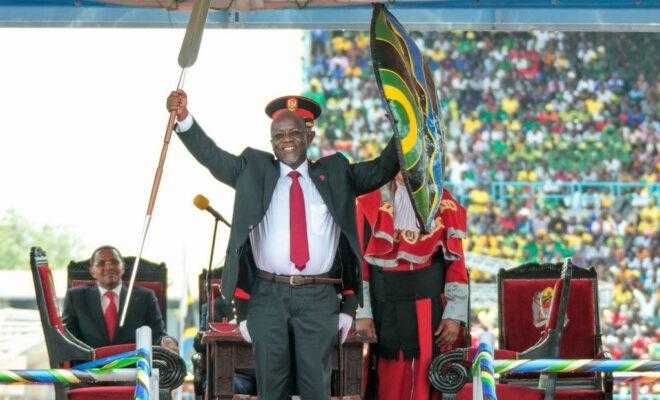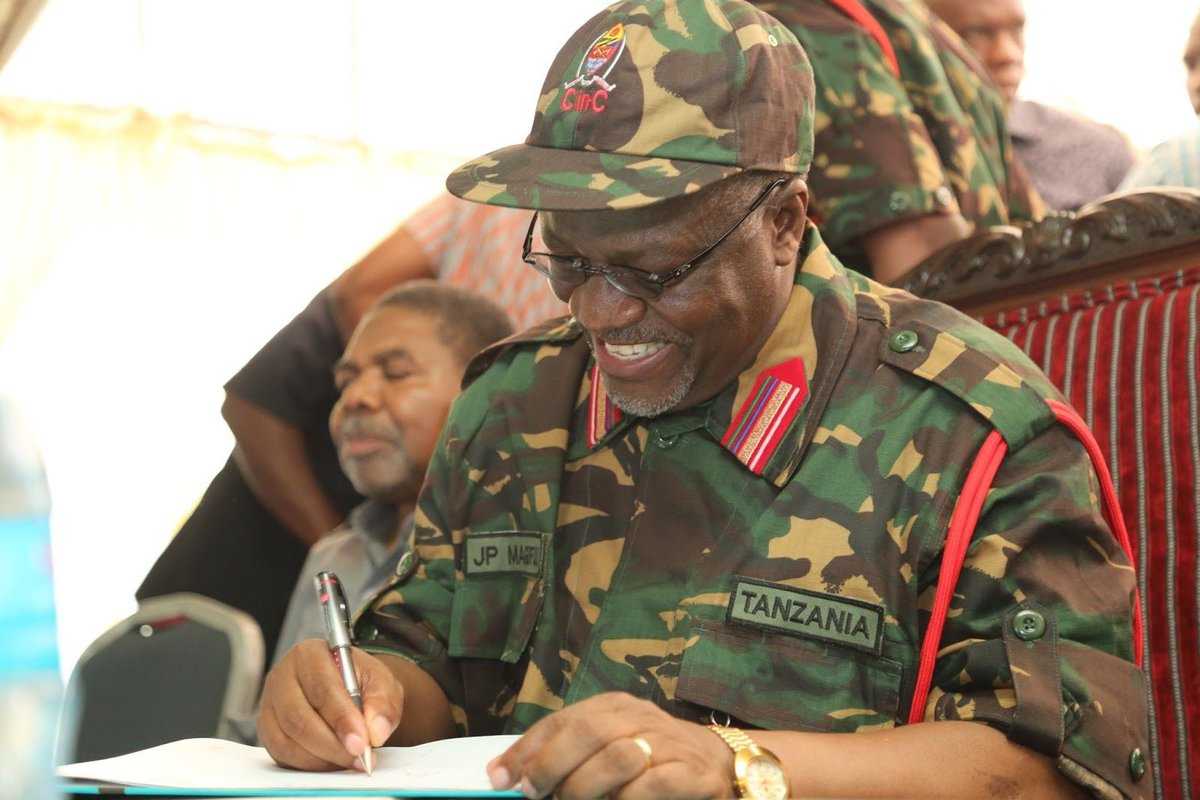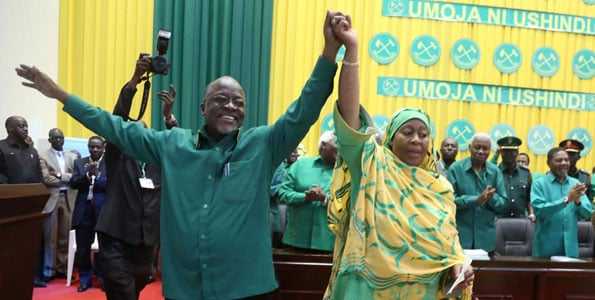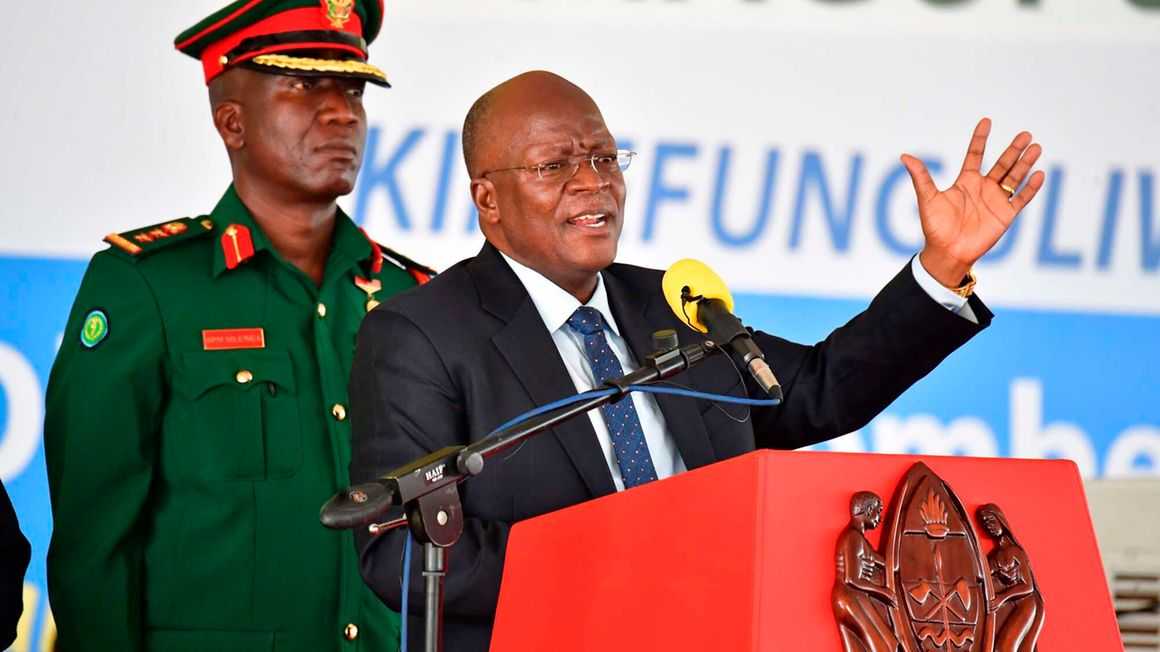BARD AI
JF-Expert Member
- Jul 24, 2018
- 3,376
- 8,120
The Tanzania Intelligence and Security Service is the national intelligence and security agency of Tanzania. The Agency works closely with other National and International intelligence agencies and security organs in the promotion and maintenance of peace, safety and security in and outside Tanzania’s borders.
An extraordinary database, which was put online last week, exposes previously top secret internal CIA reports outlining America’s longstanding concerns on China’s political, military and economic influence in Tanzania and the inner workings of former president Julius Kambarage Nyerere’s government.
The files show how the CIA had an unfavourable view of Nyerere, who was well-respected globally as a great statesman and leader of the pan-African movement.
The decades-old treasure trove of US intelligence reports reveal how the US was apparently uneasy with Nyerere’s leadership of the African liberation struggle, describing him as a “fanatic.”
The intelligence files suggest that the US government was increasingly frustrated by its inability to control or influence Nyerere, although he was a Western educated African leader.
In one secret special CIA report dated 21 May 1965, US intelligence officers expressed concern at Nyerere’s pan-Africanist position, just four years after Tanzania gained its independence from Britain.
“Tanzania under President Julius Nyerere has been drifting slowly but steadily leftward. Today, it has moved into the vanguard of Africa’s radical states and offers the Chinese communists an unusually promising opportunity to penetrate the (African) continent,” said the top secret CIA file titled “Tanzania Taking the Left Turn.”
“This process (of Chinese influence) has been under way at varying speeds since Tanganyika became independent … but has been accelerated by Nyerere’s determination to lead the struggle for the liberation of southern Africa and by Tanganyika’s union with Zanzibar. Far from coming under moderate Tanganyikan control, Zanzibar has continued to be a centre from which radical, pro-Communist influences radiate.”
In its files, the CIA makes a somewhat skewed opinion of Nyerere in the early years of Tanzania’s independence, describing him as a “weak executive who has surrounded himself with radical lieutenants.”
“On the question of African liberation, Nyerere is a fanatic. Beneath a charming personality which disarms many Westerners, he is a man of strong conviction, prepared to pay almost any price to achieve a united Africa ruled by black Africans,” said the dossier.
“Hypersensitive to any suggestion of outside interference, Nyerere has not hesitated to expel US diplomats and reject West German aid regardless of the consequences.”
The sensitive CIA documents noted how China beat the US by becoming the first nation to establish an embassy in Dar es Salaam after Tanganyika’s independence and hence “attained the most influential and trusted position.”
“China’s presence and prestige in Tanzania has increased steadily … The Chinese may eventually press too hard in Tanzania, but so far they have been more successful than the West or the Soviets in relating themselves to the Africans,” said the file.
MILITARY ESPIONAGE
In July 1971, the CIA conducted a secret intelligence case study in Tanzania titled “Chinese Communist Economic and Military Aid to Tanzania,” which shed more light into America’s decades-old fears about “all-weather” Tanzania-China relations.
“Communist China has established itself as the principal foreign presence in Tanzania during the past three years. The Chinese are now the primary source of arms and training for Tanzania’s military establishment,” said the report.
The intelligence files also reveal that the CIA conducted espionage activity to identify possible successors to Nyerere when he leaves office.
In November 1982, the CIA prepared a 25-page intelligence assessment report titled “Tanzania: Nyerere and Beyond” which looked into possible scenarios for Nyerere’s possible exit from power, including a military coup.
“President Julius Nyerere’s hold on power is slipping, in our judgement, mainly because he and his government are having increasingly difficulty dealing with Tanzania’s numerous and deepening economic problems,” said the intelligence report.
“US embassy officials in Dar es Salaam report that public criticism of Nyerere has become more widespread as these problems mount. Although we have seen no evidence of any organised opposition, discontent is growing among government officials, military personnel and the general public.”
The report also assessed various possible successors to Nyerere in 1982, including former prime minister Edward Sokoine, former army chief Gen. David Musuguri, planning and economic affairs minister Kighoma Malima, Tanzania’s ambassador to the United States Paul Bomani, prime minister Cleopa Msuya, Tanzania’s ambassador to Canada Benjamin Mkapa and personal assistant to the president, Joseph Butiku.
In October 1986, the CIA produced yet another intelligence dossier titled “Tanzania: Prospects for Change,” which was drafted just a year after Nyerere’s decision to voluntarily step down.
The US seemed to under-estimate Nyerere’s influence on key decisions in Tanzania from behind the scenes after his retirement, saying he would only do so for just a couple of years after his retirement in 1985.
“We believe that former president Julius Nyerere’s far-reaching influence will continue to affect the character of Tanzanian politics over the next two years, despite his decision to resign as chief of state … Nyerere still holds key decision-making power that can undercut the government’s authority and give continuing influence to his proteges and followers,” it said.
How Politicisation of ‘Tradecraft’ – that’s the Art of Intelligence – Could Hinder Tanzania Spy Agency’s Counter-Terror Capabilities
Evarist Chahali
07 NOVEMBER 2021
Balozi Wa Tanzania nchini Canada, shushushu mstaafu Jack Zoka “Amaliza Muda Wake.” Je Ametumbuliwa? | by Evarist Chahali | Medium
Press conference from the shadows
On November 5, 2010, the then Deputy Director General of the Tanzania Intelligence and Security Services (TISS), Jack Zoka, held a historic press conference in which he denied accusations levied against the spy agency by main opposition party, Chama cha Demokrasia na Maendeleo (Chadema).
It was historic because never in the East African nation’s history had the exceedingly secretive spy agency gone public. During the press conference, Zoka refuted Chadema’s accusations made by the party’s Presidential candidate in the 2010 general election, Dr Wilbrod Slaa, that TISS was plotting to rig the election in favour of the then incumbent, ruling party Chama cha Mapinduzi (CCM)’s candidate Jakaya Kikwete.
Two years later, same Zoka did another press conference, this time refuting allegations that the spy agency was behind an incident involving Dr Steven Ulimboka, then chairperson of the Medical Association of Tanzania, who was abducted from his home, beaten, and dumped in a forest near the main city, Dar es Salaam.
Both news conferences did little to quell long-held negative attitudes towards TISS, which have gained currency in post-1992 political reform Tanzania.
TISS vs the Opposition from the early days
Tanzania adopted plural politics in 1992. The first multiparty election in 1995 saw a spy-turned-politician, Augustine Mrema, ex-Deputy PM, standing at the main opposition party NCCR-Mageuzi presidential candidate, after he defected from the ruling party. Mrema lost the election, and it did not take long before he was embroiled in a bitter inter-party fight, which eventually led to him to quit and joined Tanzania Labour Party (TLP).
There were perceptions that the former intelligence officer joined NCCR-Mageuzi on instruction from TISS with a mission to destroy the opposition.
The following elections, in 2000 and 2005, were dominated by complaints from the opposition that the ruling party was being helped by TISS to steal their votes. However, it was the 2010 election that saw the spy agency coming out from the shadows to defend itself. The 2015 and 2020 general elections were no different.
Is TISS pro-CCM?
Reliable contacts have noted that there exists a symbiotic relationship between the intelligence agency and the ruling party. On the one hand, under CCM’s leadership, TISS has been able to operate without oversight from the government. Because Tanzania is still a hegemonic political regime, the ruling party is more powerful than the government.
On the other hand, according to sources, the spy agency treats the ruling party remaining in power as a matter of utmost importance to national security.
However, the relationship has even deeper roots. According to sources, the spy agency played a crucial part in the formation CCM in 1977 from union between Tanzania Mainland’s TANU (Tanganyika African National Union) and Zanzibar’s ASP (Afro Shirazi Party).
Pre-1992 political reform environment still exists
While the political reforms in 1992 saw the introduction of multipartyism, and there are now nineteen registered political parties in the country, such a constitutional requirement that security organs should not engage in political activities is not fully adhered to. It is no surprise, for instance, that the Police Force has earned a moniker “poli-CCM” (portmanteau of police and CCM) because of their perceived favouritism to the ruling party amid infringing the rights of the opposition.
President as de-facto TISS chief and ruling party chairperson.
The President of Tanzania is known in intelligence circles as the sponsor, i.e., the main “consumer” of intelligence reports from TISS. The same president is also the chairperson of the ruling party CCM. With no oversight, there is virtually nothing to stop the president to use the intelligence from the spy agency for the interests of CCM.
Likewise, Regional Security Officers (RSOs) and District Security Officers (DSOs) collaborate closely with ruling party’s regional and district leadership, respectively.
Schadenfreude?
Two recent terror-related events in Tanzania, could serve well in explaining the hurdles in intelligence gathering as a result could affect TISS’ capabilities in dealing with existing and future terror threat.
The incident on October 15, 2020 in which Islamic State (IS) fighters in Mozambique staged their first claimed attack into southern Tanzania, killing at least twenty people in Kitaya, Mtwara Province, and the August 25, 2021 killings of three police officers and a private security guard, in the embassy district of Dar es Salaam before the assailant was shot dead, were “celebrated” by some Tanzanians on social media.
In the latter incident, some supporters of Chadema, whose chairperson Freeman Mbowe, has been charged with terrorism-related offences, reminded security organs to after “real terrorists,” reflecting on the charges being politically motivated.
How politicisation of tradecraft, that’s the art of spying, could hinder TISS’ capabilities to deal with terror threats
The growing irrelevance, uselessness and unpopularity of the increasingly reactionary security organs in Tanzania, including TISS, is making it difficult to effectively collect relevant intelligence regarding existing and future terror threats.
Effectiveness of any intelligence service heavily depends on its ability to recruit new sources, which could be difficult with current anti-TISS sentiments.
It is conceivable to think that those who plan to put Tanzania in harms way could find support in such an environment in which security organs, like TISS, are seen as enemies of the people.
Tanzania party accuses spy agency of vote theft
Nation Media Group
November 04, 2010
Tanzania Intelligence and Security Services (TISS) deputy director, Jacky Mugendi Zoka, adresses reporters when refuting allegations by Chadema Presidential candidate, Dr Willibrod Slaa that the unit had a hand in rigging the polls. Photo | Fidelis Felix
Tanzania Intelligence and Security Services (TISS) yesterday distanced itself from claims by the Chama Cha Demokrasia na Maendeleo (Chadema) presidential candidate, Dr Willibrod Slaa, that the agency was being used to steal votes cast in favour of him.
On Wednesday, Dr Slaa told a news conference in Dar es Salaam that TISS has doctored presidential election results being announced by the National Electoral Commission (NEC) with an intention of showing that he has failed to win the elections.
TISS Deputy Director Jackie Zoka told a press conference in Dar es Salaam yesterday that Dr Slaa’s statement was intended to create disharmony between the agency and wananchi.
He said TISS has been forced to react to the allegations because they were serious and if not disproved people could take the claims by Dr Slaa seriously.
This is the first time in the history of TISS to respond to allegations levelled against the agency since the country’s independence 49 years ago.
Mr Zoka appealed to the people to brush aside Dr Slaa’s claims saying they were intended to create chaos among people.
“These allegations are very serious taking into account that they are made by a person who vying for the leadership of our nation,” said Mr Zoka.
He added: “If the allegations are left without any response there is likelihood that people could take them seriously, and it could also create an impression that a presidential winner to be announced by the national Electoral Commission (NEC) has been picked by the TISS instead of being elected by people.”
He said the whole electoral process, including voting, counting and declaration of election results, was being done in a transparent manner, adding that it does not bring to senses how TISS could be involved.
He said the voting was done in polling centres, counting of votes witnessed by political parties’ agents, filling of forms by the agents and sending the preliminary results to tallying centres.
Mr Zoka said the TISS was not involved whatsoever during this electoral chain of events. “How come TISS officials are involved in doctoring the results? These allegations are only intended to tarnish the good image of TISS,” said Zoka.
He said the fact that TISS was conducting its businesses covertly should not be the reason for tarnishing its image.
Mr Zoka asked Dr Slaa to produce evidence to support his allegations to make them credible.
He denied Dr Slaa’s claim that he received information from TISS officials, saying his claims were only aimed at breaching the prevailing peace in the country.
“In simple language we say Dr Slaa has been cheated,” said Mr Zoka.
He said the main task of TISS was to ensure national security and not a source of insecurity.
On Wednesday, Dr Slaa asked NEC to immediately rescind the presidential election results and call a fresh poll, alleging shortcomings and irregularities during and after last Sunday’s polling.
He alleged the security forces, including the police force, and NEC officials had been involved in the fabrication of election results in several areas.
The NEC chairman Judge Lewis Makame challenged Chadema to send the claims to the Commission for verification. “Where is his data showing that what we are announcing is different from what has been gathered from the polling stations?” Mr Makame posed.
“All the commission does is to verify the results before announcing them to the public. I cannot say anything more until we receive official complaints from the party,” he added.
NEC’s Director of Elections, Mr Rajabu Kiravu, said their duty was to verify the results and correct any mistakes, but not to favour any candidate or party.
“We are not doing favours to any party. We are here to correct mistakes and not otherwise,” he added.
At his press conference, Dr Slaa had also asked the NEC to conduct fresh elections in all the constituencies where problems had been noted or his party would go to court.
Latest results Wednesday placed Dr Slaa, 62-year-old firebrand politician, third after incumbent Jakaya Kikwete of the ruling Chama Cha Mapinduzi (CCM – Revolution Party) and Ibrahim Lipumba, the candidate of the Civic United Front (CUF). The results showed Kikwete was leading in 145 out of the 171 constituencies announced. Tanzania has 239 constituencies.
The Chadema candidate accused the NEC of collaborating with members of the National Intelligence to “expertly steal opposition votes in several areas of the country”.
The party, he said, had evidence of the alleged involvement of the National Intelligence and NEC officials in fabricating election results in some constituencies.
According to Dr Slaa, at one such station in Same East constituency, registration number 002586, President Kikwete had garnered 190 votes, against only 26 votes for Dr Slaa.
The Chadema candidate also alleged a plot to increase CCM candidates’ votes at the district tallying centre level. This, he alleged, is where the votes from the polling stations had been altered.
“At Muheza, No. 40401 polling centre, the CCM presidential candidate got only 92 votes and Chadema scored 57, and this was recorded by our clerks and signed at the station. But the NEC announced 359 votes for CCM and 15 votes for Chadema,” he claimed.
Chadema demanded the resignation of the TISS director, accusing him of failing to treat all Tanzanians fairly. The party also urged the international community and election observers to release their reports immediately.
He named Segerea, where, he claimed, the NEC had failed to show results forms for 36 stations in Kiwalani ward, four in Kipawa, two in Vingunguti ward and two in Tabata ward.
In Morogoro Urban constituency, the Dr Slaa claimed, clerks’ data showed that the Chadema candidate had won, but NEC had announced the CCM candidate as the victor. He also alleged irregularities in Kibakwe, Kiteto and Lindi constituencies.
An extraordinary database, which was put online last week, exposes previously top secret internal CIA reports outlining America’s longstanding concerns on China’s political, military and economic influence in Tanzania and the inner workings of former president Julius Kambarage Nyerere’s government.
The files show how the CIA had an unfavourable view of Nyerere, who was well-respected globally as a great statesman and leader of the pan-African movement.
The decades-old treasure trove of US intelligence reports reveal how the US was apparently uneasy with Nyerere’s leadership of the African liberation struggle, describing him as a “fanatic.”
The intelligence files suggest that the US government was increasingly frustrated by its inability to control or influence Nyerere, although he was a Western educated African leader.
In one secret special CIA report dated 21 May 1965, US intelligence officers expressed concern at Nyerere’s pan-Africanist position, just four years after Tanzania gained its independence from Britain.
“Tanzania under President Julius Nyerere has been drifting slowly but steadily leftward. Today, it has moved into the vanguard of Africa’s radical states and offers the Chinese communists an unusually promising opportunity to penetrate the (African) continent,” said the top secret CIA file titled “Tanzania Taking the Left Turn.”
“This process (of Chinese influence) has been under way at varying speeds since Tanganyika became independent … but has been accelerated by Nyerere’s determination to lead the struggle for the liberation of southern Africa and by Tanganyika’s union with Zanzibar. Far from coming under moderate Tanganyikan control, Zanzibar has continued to be a centre from which radical, pro-Communist influences radiate.”
In its files, the CIA makes a somewhat skewed opinion of Nyerere in the early years of Tanzania’s independence, describing him as a “weak executive who has surrounded himself with radical lieutenants.”
“On the question of African liberation, Nyerere is a fanatic. Beneath a charming personality which disarms many Westerners, he is a man of strong conviction, prepared to pay almost any price to achieve a united Africa ruled by black Africans,” said the dossier.
“Hypersensitive to any suggestion of outside interference, Nyerere has not hesitated to expel US diplomats and reject West German aid regardless of the consequences.”
The sensitive CIA documents noted how China beat the US by becoming the first nation to establish an embassy in Dar es Salaam after Tanganyika’s independence and hence “attained the most influential and trusted position.”
“China’s presence and prestige in Tanzania has increased steadily … The Chinese may eventually press too hard in Tanzania, but so far they have been more successful than the West or the Soviets in relating themselves to the Africans,” said the file.
MILITARY ESPIONAGE
In July 1971, the CIA conducted a secret intelligence case study in Tanzania titled “Chinese Communist Economic and Military Aid to Tanzania,” which shed more light into America’s decades-old fears about “all-weather” Tanzania-China relations.
“Communist China has established itself as the principal foreign presence in Tanzania during the past three years. The Chinese are now the primary source of arms and training for Tanzania’s military establishment,” said the report.
The intelligence files also reveal that the CIA conducted espionage activity to identify possible successors to Nyerere when he leaves office.
In November 1982, the CIA prepared a 25-page intelligence assessment report titled “Tanzania: Nyerere and Beyond” which looked into possible scenarios for Nyerere’s possible exit from power, including a military coup.
“President Julius Nyerere’s hold on power is slipping, in our judgement, mainly because he and his government are having increasingly difficulty dealing with Tanzania’s numerous and deepening economic problems,” said the intelligence report.
“US embassy officials in Dar es Salaam report that public criticism of Nyerere has become more widespread as these problems mount. Although we have seen no evidence of any organised opposition, discontent is growing among government officials, military personnel and the general public.”
The report also assessed various possible successors to Nyerere in 1982, including former prime minister Edward Sokoine, former army chief Gen. David Musuguri, planning and economic affairs minister Kighoma Malima, Tanzania’s ambassador to the United States Paul Bomani, prime minister Cleopa Msuya, Tanzania’s ambassador to Canada Benjamin Mkapa and personal assistant to the president, Joseph Butiku.
In October 1986, the CIA produced yet another intelligence dossier titled “Tanzania: Prospects for Change,” which was drafted just a year after Nyerere’s decision to voluntarily step down.
The US seemed to under-estimate Nyerere’s influence on key decisions in Tanzania from behind the scenes after his retirement, saying he would only do so for just a couple of years after his retirement in 1985.
“We believe that former president Julius Nyerere’s far-reaching influence will continue to affect the character of Tanzanian politics over the next two years, despite his decision to resign as chief of state … Nyerere still holds key decision-making power that can undercut the government’s authority and give continuing influence to his proteges and followers,” it said.
How Politicisation of ‘Tradecraft’ – that’s the Art of Intelligence – Could Hinder Tanzania Spy Agency’s Counter-Terror Capabilities
Evarist Chahali
07 NOVEMBER 2021
Balozi Wa Tanzania nchini Canada, shushushu mstaafu Jack Zoka “Amaliza Muda Wake.” Je Ametumbuliwa? | by Evarist Chahali | Medium
Press conference from the shadows
On November 5, 2010, the then Deputy Director General of the Tanzania Intelligence and Security Services (TISS), Jack Zoka, held a historic press conference in which he denied accusations levied against the spy agency by main opposition party, Chama cha Demokrasia na Maendeleo (Chadema).
It was historic because never in the East African nation’s history had the exceedingly secretive spy agency gone public. During the press conference, Zoka refuted Chadema’s accusations made by the party’s Presidential candidate in the 2010 general election, Dr Wilbrod Slaa, that TISS was plotting to rig the election in favour of the then incumbent, ruling party Chama cha Mapinduzi (CCM)’s candidate Jakaya Kikwete.
Two years later, same Zoka did another press conference, this time refuting allegations that the spy agency was behind an incident involving Dr Steven Ulimboka, then chairperson of the Medical Association of Tanzania, who was abducted from his home, beaten, and dumped in a forest near the main city, Dar es Salaam.
Both news conferences did little to quell long-held negative attitudes towards TISS, which have gained currency in post-1992 political reform Tanzania.
TISS vs the Opposition from the early days
Tanzania adopted plural politics in 1992. The first multiparty election in 1995 saw a spy-turned-politician, Augustine Mrema, ex-Deputy PM, standing at the main opposition party NCCR-Mageuzi presidential candidate, after he defected from the ruling party. Mrema lost the election, and it did not take long before he was embroiled in a bitter inter-party fight, which eventually led to him to quit and joined Tanzania Labour Party (TLP).
There were perceptions that the former intelligence officer joined NCCR-Mageuzi on instruction from TISS with a mission to destroy the opposition.
The following elections, in 2000 and 2005, were dominated by complaints from the opposition that the ruling party was being helped by TISS to steal their votes. However, it was the 2010 election that saw the spy agency coming out from the shadows to defend itself. The 2015 and 2020 general elections were no different.
Is TISS pro-CCM?
Reliable contacts have noted that there exists a symbiotic relationship between the intelligence agency and the ruling party. On the one hand, under CCM’s leadership, TISS has been able to operate without oversight from the government. Because Tanzania is still a hegemonic political regime, the ruling party is more powerful than the government.
On the other hand, according to sources, the spy agency treats the ruling party remaining in power as a matter of utmost importance to national security.
However, the relationship has even deeper roots. According to sources, the spy agency played a crucial part in the formation CCM in 1977 from union between Tanzania Mainland’s TANU (Tanganyika African National Union) and Zanzibar’s ASP (Afro Shirazi Party).
Pre-1992 political reform environment still exists
While the political reforms in 1992 saw the introduction of multipartyism, and there are now nineteen registered political parties in the country, such a constitutional requirement that security organs should not engage in political activities is not fully adhered to. It is no surprise, for instance, that the Police Force has earned a moniker “poli-CCM” (portmanteau of police and CCM) because of their perceived favouritism to the ruling party amid infringing the rights of the opposition.
President as de-facto TISS chief and ruling party chairperson.
The President of Tanzania is known in intelligence circles as the sponsor, i.e., the main “consumer” of intelligence reports from TISS. The same president is also the chairperson of the ruling party CCM. With no oversight, there is virtually nothing to stop the president to use the intelligence from the spy agency for the interests of CCM.
Likewise, Regional Security Officers (RSOs) and District Security Officers (DSOs) collaborate closely with ruling party’s regional and district leadership, respectively.
Schadenfreude?
Two recent terror-related events in Tanzania, could serve well in explaining the hurdles in intelligence gathering as a result could affect TISS’ capabilities in dealing with existing and future terror threat.
The incident on October 15, 2020 in which Islamic State (IS) fighters in Mozambique staged their first claimed attack into southern Tanzania, killing at least twenty people in Kitaya, Mtwara Province, and the August 25, 2021 killings of three police officers and a private security guard, in the embassy district of Dar es Salaam before the assailant was shot dead, were “celebrated” by some Tanzanians on social media.
In the latter incident, some supporters of Chadema, whose chairperson Freeman Mbowe, has been charged with terrorism-related offences, reminded security organs to after “real terrorists,” reflecting on the charges being politically motivated.
How politicisation of tradecraft, that’s the art of spying, could hinder TISS’ capabilities to deal with terror threats
The growing irrelevance, uselessness and unpopularity of the increasingly reactionary security organs in Tanzania, including TISS, is making it difficult to effectively collect relevant intelligence regarding existing and future terror threats.
Effectiveness of any intelligence service heavily depends on its ability to recruit new sources, which could be difficult with current anti-TISS sentiments.
It is conceivable to think that those who plan to put Tanzania in harms way could find support in such an environment in which security organs, like TISS, are seen as enemies of the people.
Tanzania party accuses spy agency of vote theft
Nation Media Group
November 04, 2010
Tanzania Intelligence and Security Services (TISS) deputy director, Jacky Mugendi Zoka, adresses reporters when refuting allegations by Chadema Presidential candidate, Dr Willibrod Slaa that the unit had a hand in rigging the polls. Photo | Fidelis Felix
Tanzania Intelligence and Security Services (TISS) yesterday distanced itself from claims by the Chama Cha Demokrasia na Maendeleo (Chadema) presidential candidate, Dr Willibrod Slaa, that the agency was being used to steal votes cast in favour of him.
On Wednesday, Dr Slaa told a news conference in Dar es Salaam that TISS has doctored presidential election results being announced by the National Electoral Commission (NEC) with an intention of showing that he has failed to win the elections.
TISS Deputy Director Jackie Zoka told a press conference in Dar es Salaam yesterday that Dr Slaa’s statement was intended to create disharmony between the agency and wananchi.
He said TISS has been forced to react to the allegations because they were serious and if not disproved people could take the claims by Dr Slaa seriously.
This is the first time in the history of TISS to respond to allegations levelled against the agency since the country’s independence 49 years ago.
Mr Zoka appealed to the people to brush aside Dr Slaa’s claims saying they were intended to create chaos among people.
“These allegations are very serious taking into account that they are made by a person who vying for the leadership of our nation,” said Mr Zoka.
He added: “If the allegations are left without any response there is likelihood that people could take them seriously, and it could also create an impression that a presidential winner to be announced by the national Electoral Commission (NEC) has been picked by the TISS instead of being elected by people.”
He said the whole electoral process, including voting, counting and declaration of election results, was being done in a transparent manner, adding that it does not bring to senses how TISS could be involved.
He said the voting was done in polling centres, counting of votes witnessed by political parties’ agents, filling of forms by the agents and sending the preliminary results to tallying centres.
Mr Zoka said the TISS was not involved whatsoever during this electoral chain of events. “How come TISS officials are involved in doctoring the results? These allegations are only intended to tarnish the good image of TISS,” said Zoka.
He said the fact that TISS was conducting its businesses covertly should not be the reason for tarnishing its image.
Mr Zoka asked Dr Slaa to produce evidence to support his allegations to make them credible.
He denied Dr Slaa’s claim that he received information from TISS officials, saying his claims were only aimed at breaching the prevailing peace in the country.
“In simple language we say Dr Slaa has been cheated,” said Mr Zoka.
He said the main task of TISS was to ensure national security and not a source of insecurity.
On Wednesday, Dr Slaa asked NEC to immediately rescind the presidential election results and call a fresh poll, alleging shortcomings and irregularities during and after last Sunday’s polling.
He alleged the security forces, including the police force, and NEC officials had been involved in the fabrication of election results in several areas.
The NEC chairman Judge Lewis Makame challenged Chadema to send the claims to the Commission for verification. “Where is his data showing that what we are announcing is different from what has been gathered from the polling stations?” Mr Makame posed.
“All the commission does is to verify the results before announcing them to the public. I cannot say anything more until we receive official complaints from the party,” he added.
NEC’s Director of Elections, Mr Rajabu Kiravu, said their duty was to verify the results and correct any mistakes, but not to favour any candidate or party.
“We are not doing favours to any party. We are here to correct mistakes and not otherwise,” he added.
At his press conference, Dr Slaa had also asked the NEC to conduct fresh elections in all the constituencies where problems had been noted or his party would go to court.
Latest results Wednesday placed Dr Slaa, 62-year-old firebrand politician, third after incumbent Jakaya Kikwete of the ruling Chama Cha Mapinduzi (CCM – Revolution Party) and Ibrahim Lipumba, the candidate of the Civic United Front (CUF). The results showed Kikwete was leading in 145 out of the 171 constituencies announced. Tanzania has 239 constituencies.
The Chadema candidate accused the NEC of collaborating with members of the National Intelligence to “expertly steal opposition votes in several areas of the country”.
The party, he said, had evidence of the alleged involvement of the National Intelligence and NEC officials in fabricating election results in some constituencies.
According to Dr Slaa, at one such station in Same East constituency, registration number 002586, President Kikwete had garnered 190 votes, against only 26 votes for Dr Slaa.
The Chadema candidate also alleged a plot to increase CCM candidates’ votes at the district tallying centre level. This, he alleged, is where the votes from the polling stations had been altered.
“At Muheza, No. 40401 polling centre, the CCM presidential candidate got only 92 votes and Chadema scored 57, and this was recorded by our clerks and signed at the station. But the NEC announced 359 votes for CCM and 15 votes for Chadema,” he claimed.
Chadema demanded the resignation of the TISS director, accusing him of failing to treat all Tanzanians fairly. The party also urged the international community and election observers to release their reports immediately.
He named Segerea, where, he claimed, the NEC had failed to show results forms for 36 stations in Kiwalani ward, four in Kipawa, two in Vingunguti ward and two in Tabata ward.
In Morogoro Urban constituency, the Dr Slaa claimed, clerks’ data showed that the Chadema candidate had won, but NEC had announced the CCM candidate as the victor. He also alleged irregularities in Kibakwe, Kiteto and Lindi constituencies.
